|
|
|
Sort Order |
|
|
|
Items / Page
|
|
|
|
|
|
|
| Srl | Item |
| 1 |
ID:
072282


|
|
|
|
|
| Publication |
2006.
|
| Summary/Abstract |
In the modern global economy, transnational corporations have become important sources of technology, market access and capital - all of which states seek in propelling economic growth. States themselves provide territory, and establish the 'rules of the game' by which corporations may operate within that territory. However, with the commodification and commercialisation of indigenous cultural and intellectual property, states are bypassed and negotiations emerge between corporations and sub-state actors who claim to represent population segments. May the bypassing of the state further weaken national or state identity among indigenous groups? Such is the case that may be emerging in Africa with groups who claim profits derived from the development and marketing of indigenous cultural and intellectual property. This paper explores the possibility that profit-sharing agreements between transnational corporations and sub-state groups may contribute to the widening of ethnic cleavages in African states by promoting inequalities between groups.
|
|
|
|
|
|
|
|
|
|
|
|
|
|
|
|
| 2 |
ID:
151752
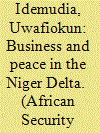

|
|
|
|
|
| Summary/Abstract |
The global restructuring of state–society relationships driven by neoliberal logic has not only allowed for the taming of the ‘state’, which has paradoxically accentuated its inadequacies, but has also facilitated, for better or for worse, the emergence of business – especially transnational corporations – as a major political force in global governance. Consequently, while the issues of peace and conflict have traditionally been the concern of governments, businesses are now increasingly being expected to make peace and conflict their concern. However, despite claims and counterclaims that businesses can be moneymakers and peacemakers, analyses of the relationship between business and peace remain largely embryonic. This paper seeks to contribute to this emerging business and peace debate by drawing on insights from the Niger Delta conflict to ascertain what we know and what we need to know if businesses are to become peacemakers in conflict zones in Africa.
|
|
|
|
|
|
|
|
|
|
|
|
|
|
|
|
| 3 |
ID:
165067


|
|
|
|
|
| Summary/Abstract |
The question that motivates this article is: what are the mechanisms through which the prosecution of the drug war in Latin America lead to human rights repression? In answering this question, I theorise that drug enforcement is a coalition of actors that facilitates domestic and international consensus around prohibition as a mechanism for corporate expansion. Drug war infrastructure financing is likely to facilitate the expansion of corporate investments by resource-seeking industries that require greater land use, which encroaches on the ancestral territories of indigenous peoples. And, in response to indigenous resistance to corporate appropriation of ancestral lands, resource-seeking transnational corporations will collude with private security firms and paramilitary organisations to repress and eliminate indigenous resistance. In the process of accumulating capital in Latin America, transnational corporations, domestic security, and paramilitary organizations are the drug enforcement coalition’s mediators of terror.
|
|
|
|
|
|
|
|
|
|
|
|
|
|
|
|
| 4 |
ID:
088083


|
|
|
|
|
| Publication |
2009.
|
| Summary/Abstract |
This article analyzes the emergence of new human rights norms for transnational corporations. It first explores voluntary norm-making approaches, which have been a staple of this issue area since the 1970s. Second, it analyzes the formulation and eventual fall of the UN Draft Norms on the Responsibilities of Transnational Corporations and Other Business Enterprises with Regard to Human Rights. A final section reflects on the work of the UN special representative of the secretary-general on business and human rights, John Ruggie, and the future of norm making in this area. It is argued that these three processes constitute differing but fundamental steps toward the construction of international human rights norms for corporations and that, although norm entrepreneurs have clashed in debates over voluntary versus binding standards, norm making in this area remains healthy thanks to a now more solid international awareness regarding the corporate responsibility toward human rights.
|
|
|
|
|
|
|
|
|
|
|
|
|
|
|
|
| 5 |
ID:
088084


|
|
|
|
|
| Publication |
2009.
|
| Summary/Abstract |
This article analyzes the emergence of new human rights norms for transnational corporations. It first explores voluntary norm-making approaches, which have been a staple of this issue area since the 1970s. Second, it analyzes the formulation and eventual fall of the UN Draft Norms on the Responsibilities of Transnational Corporations and Other Business Enterprises with Regard to Human Rights. A final section reflects on the work of the UN special representative of the secretary-general on business and human rights, John Ruggie, and the future of norm making in this area. It is argued that these three processes constitute differing but fundamental steps toward the construction of international human rights norms for corporations and that, although norm entrepreneurs have clashed in debates over voluntary versus binding standards, norm making in this area remains healthy thanks to a now more solid international awareness regarding the corporate responsibility toward human rights.
|
|
|
|
|
|
|
|
|
|
|
|
|
|
|
|
| 6 |
ID:
190180
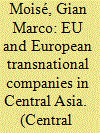

|
|
|
|
|
| Summary/Abstract |
This article argues that in the contentious energy market of Central Asia transnational corporations (TNCs) and local governments are the real forces at play. While the European Union (EU) has repeatedly shown interest in the region, scarce profitability of the economic ventures and lack of control over the actual investors have resulted in a loss of interest. Deconstructing the EU energy security strategy towards Central Asia, this article reflects how TNCs formally based in Europe have used the ‘Shield of Nationality’ as protection from the blows of resource-rich governments, while remaining driven by capital accumulation. A case study of the Italian oil and gas company ENI in Kazakhstan highlights how the mediation of home governments between corporations and local administrations depends on its relationship with the TNC. The article suggests that future research of the energy sector should consider the role of TNCs and their ambiguous relationship with their ‘home countries’.
|
|
|
|
|
|
|
|
|
|
|
|
|
|
|
|
| 7 |
ID:
139441
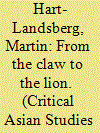

|
|
|
|
|
| Summary/Abstract |
This article argues that capitalist globalization is largely responsible for creating or intensifying many of our most serious economic and social problems. It first describes the forces that drove core country transnational corporations to create a complex system of cross-border production networks. It then maps the resulting new international division of labor, in which Asian countries, especially China, import primary commodities from Latin American and sub-Saharan African countries to produce exports for core countries, especially the United States. In core countries, globalization has led to the destruction of higher paying jobs, financialization of economic activity, and stagnation. While the new international division of labor has boosted third world rates of growth, especially in Asia, it has also left the third world with unbalanced and inequitable economies. Moreover, contradictions in the globalization process point to the spread of core country stagnation to the third world. Capitalist globalization has increased third world dependence on core country consumption while simultaneously undermining core country purchasing power. The article ends by discussing a process and program of transformation that highlights the feasibility of an alternative to global capitalism as well as the organizational capacities and institutional arrangements that must be developed if we are to realize it.
|
|
|
|
|
|
|
|
|
|
|
|
|
|
|
|
| 8 |
ID:
154257
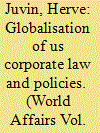

|
|
|
|
|
| Summary/Abstract |
This article raises an alarm about the expanding hegemony of big business promoted by the US and transnational corporations. The global reach of American jurisdiction is being used to exact heavy financial and legal penalties on foreign nations and companies and promote US interests in the name of economic globalisation, as part of the agenda for fi ghting corruption and terrorism. The article highlights the threats to national sovereignty, cultural diversity and economic autonomy posed by the ruling US centric financial system.
|
|
|
|
|
|
|
|
|
|
|
|
|
|
|
|
| 9 |
ID:
114312
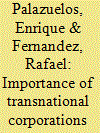

|
|
|
|
|
| Publication |
2012.
|
| Summary/Abstract |
This paper analyzes the positioning of European and American transnational oil companies in the supply of oil from outside Europe to European countries. The analysis focuses on the triangular relationship between: the control that these companies exercise over oil refining and the marketing of petroleum products in Europe; the international production of crude by these companies in oil regions; and the import of crude oil by European countries. Two indicators were developed to assess the relevance of these large corporations: (a) the extent of the supply to their European refineries via their own international production, and (b) the contribution of each company to the total crude oil imports received by six European countries.
|
|
|
|
|
|
|
|
|
|
|
|
|
|
|
|
| 10 |
ID:
143524
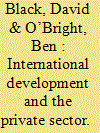

|
|
|
|
|
| Summary/Abstract |
Historically, the relationship between the private sector and international development has been deeply ambivalent. For many, a vibrant private sector and competitive markets are the essential prerequisites of development. For many others, development is principally concerned with ameliorating the dislocation associated with capitalist profit seeking. In the last generation, this ambivalence has given way to an emphasis on the complementarities between the private sector and development. Yet skeptics have continued to criticize the form of development this trend has promoted. We review the historical conditions behind this trend; the controversies concerning transnational corporations and foreign direct investment; the rise of corporate social responsibility; the parallel rise of philanthrocapitalism; and the growth of micro-credit as a market-oriented vehicle for poverty alleviation and empowerment. When taken together, it is clear that private sector actors have become increasingly influential in the new landscape of development, yet their effects remain ambiguous.
|
|
|
|
|
|
|
|
|
|
|
|
|
|
|
|
| 11 |
ID:
074033
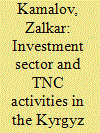

|
|
|
| 12 |
ID:
154788
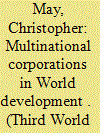

|
|
|
|
|
| Summary/Abstract |
In light of the 2014 Ecuador-sponsored resolution at the UN Human Rights Council to examine the link between Transnational Corporations and Human Rights, in this paper I review the first major discussion at the United Nations of the role of multinational corporations. The report on Multinational Corporations in World Development (1973) for the UN Department of Economic and Social affair launched the (then) new UN Centre on Transnational Corporations. I examine the report in some detail, compare and contrast this with the Ecuadorian resolution from 2014, and reflect on the continuities and changes in attempts to regulate the conduct of global corporations over the 40 years between these two moments.
|
|
|
|
|
|
|
|
|
|
|
|
|
|
|
|
| 13 |
ID:
077387
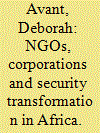

|
|
|
|
|
| Publication |
2007.
|
| Summary/Abstract |
Transnational non-state actors interested in maintaining a presence in parts of the world where the state is weak are an important part of the privatization of security that has not been well analyzed. In this article I lay out propositions about how an increasing role for non-state actors in security may transform the conceptualization of security and the use of violence more generally. I argue that international NGOs and transnational corporations conceptualize security and how to achieve it differently than states have traditionally done and that these differences have potential consequences for which problems are addressed, as well as for whether and how violence is used in the communities where they operate
|
|
|
|
|
|
|
|
|
|
|
|
|
|
|
|
| 14 |
ID:
074031
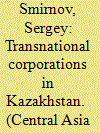

|
|
|
| 15 |
ID:
116128
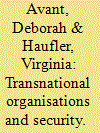

|
|
|
|
|
| Publication |
2012.
|
| Summary/Abstract |
The fields of international relations and criminology analyse security from different directions, but both have had a dominant focus on states and state agencies until recently. Even as they looked at a wider range of actors as security providers, an important category of security actors has not been analysed so far - 'non-violent' transnational organisations. Transnational non-governmental organisations (NGOs) and transnational corporations (TNCs) are not security organisations per se, but the strategies these transnational non-state actors pursue in response to violence affect security for both themselves and the societies in which they operate. We argue here that security at the local level is an outcome of interactions among diverse actors including transnational organisations and call for a research agenda focused on how transnational actors choose their response to insecurity and how those choices affect security governance.
|
|
|
|
|
|
|
|
|
|
|
|
|
|
|
|
| 16 |
ID:
072416
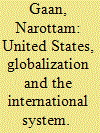

|
|
|
| 17 |
ID:
132909
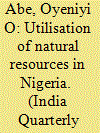

|
|
|
|
|
| Publication |
2014.
|
| Summary/Abstract |
Environmental justice continues to be a concept that seemingly eludes our human capability; yet, the economic benefits derivable from exploration and utilisation of the environment are unquantifiable. A brief attempt on environmental rights and its applicability in practice in Nigeria has been carried out in this article. The article analyses the nature of the socio-political impulses at work in ensuring that environmental justice is either hindered or realised. While examining the right to clean environment, this article discusses the culpability of transnational corporations for their acts in environmental degradation. It argues for the enforceability of environmental justice under the constitution and indeed under customary international law. It also examines the implications of several international human right treaties which Nigeria has assented to. The article calls for more punitive measures in environmental statues. Nigeria must adopt international principles aimed at safeguarding the rights and interest of peoples on earth. Not only must there be the means to implement these rights, but also there must be adequate and responsible enforcement mechanisms in place. Government must not only be serious but must also be manifestly seen to be so.
|
|
|
|
|
|
|
|
|
|
|
|
|
|
|
|
|
|
|
|
|